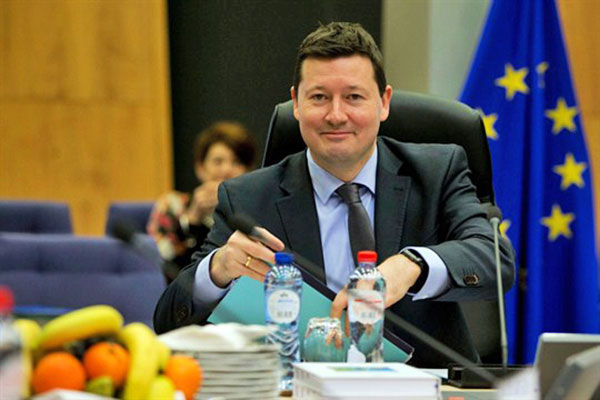|
also from GoogleWebCache
But a less-noticed
scandal over a bureaucratic appointment in Brussels might offer a
better explanation of just what is driving the voter backlash
against the union.
It revolves around Martin Selmayr, the former chief of staff to European Commission President Jean-Claude Juncker, who was promoted in late February to serve as secretary-general of the commission.
That would hardly register as news out of Brussels even on a slow day.
But a steady drip of revelations and leaks since then has made
it increasingly clear that the EU subverted its own strict rules
regarding hiring and promotions in order to parachute Selmayr into
the post.
Once that box was ticked, Selmayr was almost instantly
appointed to the secretary-general position, which became available
only after the surprise resignation of the previous office-holder
and was not publicly announced or opened to other candidates.
Against the backdrop of a recent proposal backed by Selmayr to significantly increase the already generous severance package for sitting EU commissioners - who could have raised red flags on his promotion - and fears that as secretary-general he might try to encroach on the independence of the commission's legal service, it takes on a more nefarious appearance.
The commission's spokespeople
have denied any wrongdoing, but they have already been caught in a
series of misleading and, at times, false statements about the
affair.
As head of the commission's 33,000-member civil service, the secretary-general wields enormous power within the union's bureaucracy, so anything out of the ordinary in the selection process would inevitably garner at least a second glance.
Moreover, according to most press accounts, Selmayr is as feared and reviled for his Machiavellian ruthlessness as he is admired for his bureaucratic effectiveness.
So while many EU bureaucrats were too cowed to speak out, at least some felt enough animosity toward him to tip off journalists.
Finally, the revelations are largely the
result of dogged reporting by French correspondent Jean Quatremer,
himself a fixture of the EU press corps known for his deep support
for the European project but also his fearless coverage of its
dysfunctions.
In the Europhobes' telling, EU technocrats hammer out directives in offices shielded from scrutiny or accountability by an opaque and anti-democratic policy process.
The directives - or "diktats" in the
Europhobes' lexicon - are then imposed on member states and their
electorates with little regard to the resulting costs and
disruption.
for his Machiavellian ruthlessness as he is admired
for his bureaucratic effectiveness.
But there is a grain of
truth to it, and Selmayr-gate, should it gain traction, has the
potential to be a lasting stain on the EU's image precisely because
it anecdotally confirms people's worst suspicions.
Since the defeat of Dutch populist Geert Wilders in the Netherlands' general elections last March and the election of French President Emmanuel Macron last May, the conventional wisdom has been that Europe had held back the populist wave that seemed poised to sweep over it in 2016.
Macron in
particular was a vocal supporter of the EU during the election
campaign, vowing to push for reforms - and a more protective trade
policy, particularly with regard to China - to strengthen the EU's
ability to shield Europeans from the disruptions of global
competition and liberalized trade.
Merkel finally sealed a coalition deal last month, with her coalition partners, the Social Democrats, formally announcing their ratification of the agreement Sunday.
The Social
Democrats, or SPD, have expressed strong support for Macron's reform
agenda, and the fact that they won the Foreign Ministry in the
coalition talks suggests Merkel might be willing to go further than
many expected in backing his reforms.
But even if
he were to succeed in pushing all of it through, it's uncertain it
would significantly change Europeans' day-to-day experience of the
EU enough to diminish the appeal of its detractors.
For now, the immediate practical outcome in Rome is extended political uncertainty and paralysis, once again sidelining a major EU member state without which reforms cannot be advanced.
That means
the EU's period of limbo - which really dates back to Macron's
election, since no real progress on reforms was possible until
Germany had voted - is set to continue indefinitely...
The narrative of Europe having held back the populist tide was always reductive. At best, as I argued almost a year ago, Europhiles won a reprieve that they needed to put to good use if they hoped to win back disillusioned voters.
But if Selmayr-gate is any indication, Brussels has yet to
draw the necessary conclusions from its year of living dangerously...
|


